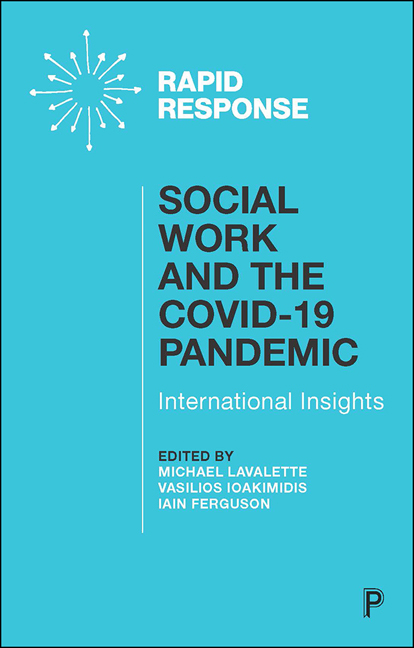Introduction: Social Work and COVID-19
Published online by Cambridge University Press: 23 March 2021
Summary
At the start of 2020, when the COVID-19 pandemic began, a hastily convened meeting between the Social Work Action Network (SWAN) and the International Federation of Social Workers (IFSW) agreed that the organisations should jointly host a series of webinars tracing the social work response to the crisis. The result was four international webinar meetings that drew thousands of academics and practitioners together to discuss what social work could – and should – do during the pandemic.
The webinars were structured around two sets of ideas, drawn from aspects of the works of Naomi Klein and Rebecca Solnit.
In Klein's work, The Shock Doctrine: The Rise of Disaster Capitalism (2007), she draws attention to the fact that ‘disasters’ (including earthquakes, tsunamis, floods and monsoons, but also military coups, wars or deep economic recessions) can produce what she terms ‘social shock’. In this situation, people are so focussed on the immediate (saving the lives of their families and those in their communities, meeting people's basic needs, dealing with the social costs of the disaster) that they lose sight of what can happen to the provision of core public and welfare services.
For large corporations and international capital, however, such disasters – and the disorientation they create – provides an opportunity. A chance to move in and scoop up all manner of contracts and services which effectively become ‘outsourced’ to private interests. This process she described as the shock doctrine. As she notes:
“Shock doctrine” describes the brute tactic of systematically using the public's disorientation following a collective shock ‒ wars, coups, terrorist attacks, market crashes, natural disasters ‒ to push through radical pro-corporate measures, often called “shock therapy.” … [At its core] … is the use of cataclysmic events to advance radical privatization combined with the privatization of the disaster response itself. (Klein 2019)
As we confronted the COVID-19 pandemic, how would the ‘shock doctrine’ play out?
Certainly, from the perspective of the UK there is no doubt that the pandemic has offered ‘an opportunity’ for some to make very significant profits. As Evans et al. note: “State contracts worth over £1bn have been awarded to private companies dealing with the coronavirus pandemic, without offering other firms the chance to bid for the work” (2020). Evans et al. (2020) traced how 177 government contracts were offered outside normal regulatory scrutiny, raising significant questions about transparency and accountability.
- Type
- Chapter
- Information
- Social Work and the COVID-19 PandemicInternational Insights, pp. 1 - 6Publisher: Bristol University PressPrint publication year: 2020



